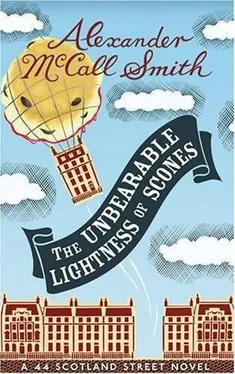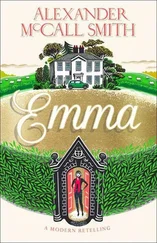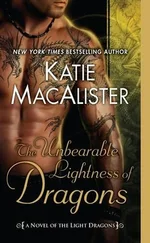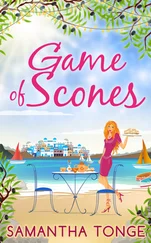Alexander Smith - Unbearable Lightness of Scones
Здесь есть возможность читать онлайн «Alexander Smith - Unbearable Lightness of Scones» весь текст электронной книги совершенно бесплатно (целиком полную версию без сокращений). В некоторых случаях можно слушать аудио, скачать через торрент в формате fb2 и присутствует краткое содержание. Жанр: Триллер, на английском языке. Описание произведения, (предисловие) а так же отзывы посетителей доступны на портале библиотеки ЛибКат.
- Название:Unbearable Lightness of Scones
- Автор:
- Жанр:
- Год:неизвестен
- ISBN:нет данных
- Рейтинг книги:4 / 5. Голосов: 1
-
Избранное:Добавить в избранное
- Отзывы:
-
Ваша оценка:
- 80
- 1
- 2
- 3
- 4
- 5
Unbearable Lightness of Scones: краткое содержание, описание и аннотация
Предлагаем к чтению аннотацию, описание, краткое содержание или предисловие (зависит от того, что написал сам автор книги «Unbearable Lightness of Scones»). Если вы не нашли необходимую информацию о книге — напишите в комментариях, мы постараемся отыскать её.
Unbearable Lightness of Scones — читать онлайн бесплатно полную книгу (весь текст) целиком
Ниже представлен текст книги, разбитый по страницам. Система сохранения места последней прочитанной страницы, позволяет с удобством читать онлайн бесплатно книгу «Unbearable Lightness of Scones», без необходимости каждый раз заново искать на чём Вы остановились. Поставьте закладку, и сможете в любой момент перейти на страницу, на которой закончили чтение.
Интервал:
Закладка:
He wondered how he could suffuse these few ordinary things with a feeling of immanence. What were they? A blue jug of the sort painted by so many Scottish artists – a Glasgow jug, as it was called. Indeed, the presence of a blue jug was more or less a requisite of any echt Scottish still life; so much so, perhaps, that it might have been the same blue jug that appeared in all those paintings. One might imagine William Crosbie telephoning Alberto Morrocco and asking him if he had finished with the blue jug, as he wanted to start work on a still life. And Alberto Morrocco would have replied that unfortunately he had just passed it on to William Gillies, who said that he would need it for a week or so, until he had finished his current still life, but would a bowl, replete with apples, do instead?
There was the blue jug, occupying centre stage on the tablecloth. And beside it, a modest green glass Art Nouveau inkwell, with its top open, plus a small posy of dried lavender, and a bunch of over-ripe grapes on a Minton plate. The over-ripeness of the grapes could be remedied in the painting, Angus thought, but could he remedy the essentially static nature of the objects he had chosen?
He was searching for the answer to this unsettling problem when he heard the doorbell ring. His dog, Cyril, who had been sitting beside the table – although he would, by nature, have to be excluded from the still life – perked up his head at the sound. As he did so, he uttered a low growl, baring his teeth slightly; the sun, slanting down from the studio window, caught the dog’s single gold tooth and flashed a tiny glint of light, like the warning of a minute Aldiss lamp.
7. Art of the Matter
Angus did not like being disturbed when painting, as it broke what he thought of as his train of artistic thought. In reality it was not so much a train of thought as a mood, since all manner of unconnected thoughts crossed his mind while painting; no train, real or metaphorical, would ever be so loosely organised as this. Some of the thought, indeed, was fantasy – mild, Walter-Mittyish (Waltermittilich, as the Germans now have it, or should have, if they don’t) thoughts; imagined meetings with the Scottish Government in which he was asked to take over what the requesting civil servant described as “the culture brief.” And Angus would laugh and say, “Well, we’ll start by avoiding terms like that!” But then, magnanimously, he would agree – subject to time being available – and he would announce the abandonment of the intrusive attempts by politicians to control cultural institutions or to use culture as an instrument of social engineering. There would be grants – large ones – available to those of real talent in the world of painting, particularly to those who showed some ability to draw, a skill notably lacking, Angus thought, in so many aspirants to the Turner Prize. He agreed with David Hockney that an artist really had to be able to draw before anything else could be achieved. Now, Hockney could draw, as Angus often pointed out in the Cumberland Bar.
Then there would be grants for portrait painters, or Civil List pensions, perhaps, of the sort awarded to MacDiarmid. The importance of the portrait would be stressed in his new arts policy, just as the utterly ephemeral nature of installation art would be made crystal clear. Those unfortunate gallery cleaners who threw expensive installations out in the belief that they were rubbish would be vindicated, perhaps even given the grants taken away from those of whose work they disposed. And as for portraiture – what a glorious age would begin for this unjustly neglected branch of painting! The spirit of Henry Raeburn would again make itself felt in Edinburgh, and people would once more take an interest in the human face, not under the false light of our vain contemporary quest for beauty, but as the incorporation of humanity’s virtues and vices.
Look at Raeburn, Angus once remarked to Domenica Macdonald. Everything is there in those faces: wisdom, tolerance, learning.
“But not pride,” said Domenica. “Raeburn’s subjects don’t look proud, do they?”
Angus mused for a moment. “Is there no pride there?” He thought of some of the better-known portraits: Francis Macnab, the MacNab, draped in tartan and wearing a muckle hairy sporran. Was the face not proud? Or was it just grim? To be an anything must be difficult; how much easier going through life being just a something. Scottish aristocrats, of course, were odd. They belonged to a national tradition that did not really approve of anybody getting too above himself, and yet there they were, genuine, twenty-four-carat toffs, and if you were too demotic then what was the point of being a toff in the first place?
“Henry Raeburn was a kind man,” he said. “Some of his subjects may have suffered from pride, but it doesn’t really come through in the paintings. He concentrated on other things. One has to be charitable as a portrait painter.”
Domenica raised an eyebrow. “Does one? And why? Because the person you’re painting is paying the bill?”
Angus had to concede that this might sometimes happen. “Court painters, that sort of person does that, yes. And I suppose all those paintings of chairmen of the board – sometimes I think that those paintings are done to keep the share price up. If you had an honest portrait of the chairman, one showing him to be all worn out with care and heading for a heart attack, then… well, it wouldn’t help.”
“Nor would portraits of military figures showing their gentle side,” suggested Domenica.
“No, that might not help one’s defence posture,” agreed Angus. He paused. “I painted George Robertson once, you know. It was while he was Secretary General of NATO.”
“Did you make him look resolute?” asked Domenica.
“Reasonably so,” said Angus. “But he looked fairly resolute anyway. He came out of it very well. I got on very well with him. He has a sense of humour, you see. And he’s a great man. He comes from Islay, you know, and that’s an island that always produces good men and good whisky.”
“Not a portrait to scare NATO’s enemies?”
“My portraits don’t scare anybody,” said Angus. “Mind you, I did once, years ago, do a little picture of Margaret Thatcher – bless her – a tiny little miniature. Then I pasted it onto a matchbox.”
Domenica looked puzzled. “Oh?”
Angus smiled. “Yes. Then I stood the matchbox outside a mouse hole. The mouse had been bothering me – he had gnawed away at some canvas I had. So I used it as a mouse-scarer. It was more humane than a mouse-trap, you see. The mouse came out and saw this picture of Margaret Thatcher staring at him and he ran straight back into the hole. It was very effective.”
“Did she scare us that much?” asked Domenica, trying to remember.
“Yes,” said Angus. “She scared everybody. She was nanny, you see. She was a stern nanny who marched into the nursery and read the Riot Act. She told us to tidy up our rooms, that’s what she did.”
“I suppose she did,” mused Domenica. “But did people listen?”
“At first they didn’t,” said Angus. “But then they realised how strict she was. Nanny had a hairbrush and she whacked people with it. The miners. The Argentines. The railways. The universities. Whack, whack!”
Domenica remembered. Yes, there had been a great deal of chastisement, and not everybody had enjoyed it. “Didn’t Oxford refuse her an honorary degree?”
Angus nodded. “Yes, it was a bit petulant, I thought. Rather like a child saying, I won’t invite you to my birthday party. You know how children are always doing that – it’s their only little bit of power.”
“Yes. And what did Maggie say?”
“Oh, she was wonderful,” said Angus. “She replied in kind. She said she didn’t want to come anyway. Which is exactly what one child says to another when that particular threat is made.”
Читать дальшеИнтервал:
Закладка:
Похожие книги на «Unbearable Lightness of Scones»
Представляем Вашему вниманию похожие книги на «Unbearable Lightness of Scones» списком для выбора. Мы отобрали схожую по названию и смыслу литературу в надежде предоставить читателям больше вариантов отыскать новые, интересные, ещё непрочитанные произведения.
Обсуждение, отзывы о книге «Unbearable Lightness of Scones» и просто собственные мнения читателей. Оставьте ваши комментарии, напишите, что Вы думаете о произведении, его смысле или главных героях. Укажите что конкретно понравилось, а что нет, и почему Вы так считаете.












